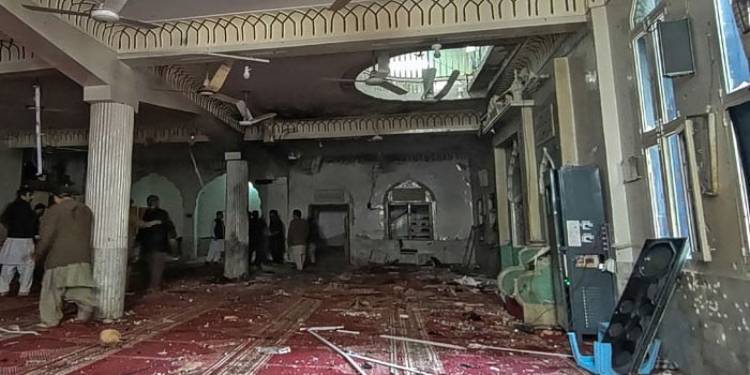
Details regarding the Peshawar Police Lines mosque suicide blast have been shared with the media.
As per the investigation's findings, Trinitrotoluene (TNT) explosive material was used in the suicide attack. The suicide bomber targeted the old premises of the mosque, which was erected on just bricks and had no pillar at all. The investigators declared that since pillars were not used in construction, that is why the roof and walls of the mosque collapsed, causing a large number of casualties.
Moreover, details regarding the suicide bomber and his network have also been gathered, and efforts are underway to bust the network.
On January 30, suicide bomber exploded himself inside the Police Lines mosque in Peshawar that resulted into martyrdom of 84 people, mostly police personnel.
A powerful explosion ripped through a mosque in Peshawar’s Red Zone area where between 300 and 400 people — mostly police officers — had gathered for prayers. The suicide blast blew away the wall of the prayer hall and an inner roof.
The outlawed Tehreek-i-Taliban Pakistan had initially claimed responsibility for the attack. It later distanced itself from it but sources earlier indicated that it might have been the handiwork of some local faction of the outlawed group.
The police released a list of the martyrs and prayed for them and their families.
“May the people of the Islamic Republic of Pakistan, the Khyber Pakhtunkhwa police, and other institutions lead the way in fulfilling the duty of protecting our great religion of Islam and the nation,” the police said.
Pakistan has been hit by a wave of terrorism, mostly in KP, but also in Balochistan and the Punjab town of Mianwali, which borders KP. A terror attack also reached as far as the peripheries of Islamabad.
January was the deadliest month since 2018, in which 134 people lost their lives — a 139 per cent spike — and 254 received injuries in at least 44 militant attacks across the country.
As per the investigation's findings, Trinitrotoluene (TNT) explosive material was used in the suicide attack. The suicide bomber targeted the old premises of the mosque, which was erected on just bricks and had no pillar at all. The investigators declared that since pillars were not used in construction, that is why the roof and walls of the mosque collapsed, causing a large number of casualties.
Moreover, details regarding the suicide bomber and his network have also been gathered, and efforts are underway to bust the network.
On January 30, suicide bomber exploded himself inside the Police Lines mosque in Peshawar that resulted into martyrdom of 84 people, mostly police personnel.
A powerful explosion ripped through a mosque in Peshawar’s Red Zone area where between 300 and 400 people — mostly police officers — had gathered for prayers. The suicide blast blew away the wall of the prayer hall and an inner roof.
The outlawed Tehreek-i-Taliban Pakistan had initially claimed responsibility for the attack. It later distanced itself from it but sources earlier indicated that it might have been the handiwork of some local faction of the outlawed group.
The police released a list of the martyrs and prayed for them and their families.
“May the people of the Islamic Republic of Pakistan, the Khyber Pakhtunkhwa police, and other institutions lead the way in fulfilling the duty of protecting our great religion of Islam and the nation,” the police said.
Pakistan has been hit by a wave of terrorism, mostly in KP, but also in Balochistan and the Punjab town of Mianwali, which borders KP. A terror attack also reached as far as the peripheries of Islamabad.
January was the deadliest month since 2018, in which 134 people lost their lives — a 139 per cent spike — and 254 received injuries in at least 44 militant attacks across the country.

